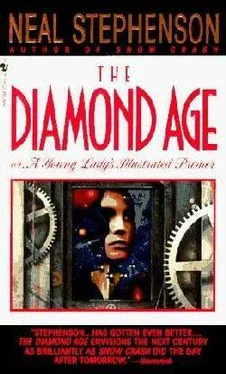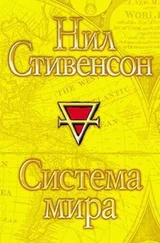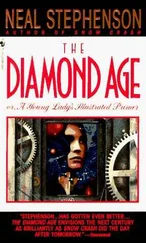Нил Стивенсон - Diamond Age
Здесь есть возможность читать онлайн «Нил Стивенсон - Diamond Age» весь текст электронной книги совершенно бесплатно (целиком полную версию без сокращений). В некоторых случаях можно слушать аудио, скачать через торрент в формате fb2 и присутствует краткое содержание. Жанр: Киберпанк, на английском языке. Описание произведения, (предисловие) а так же отзывы посетителей доступны на портале библиотеки ЛибКат.
- Название:Diamond Age
- Автор:
- Жанр:
- Год:неизвестен
- ISBN:нет данных
- Рейтинг книги:3 / 5. Голосов: 1
-
Избранное:Добавить в избранное
- Отзывы:
-
Ваша оценка:
- 60
- 1
- 2
- 3
- 4
- 5
Diamond Age: краткое содержание, описание и аннотация
Предлагаем к чтению аннотацию, описание, краткое содержание или предисловие (зависит от того, что написал сам автор книги «Diamond Age»). Если вы не нашли необходимую информацию о книге — напишите в комментариях, мы постараемся отыскать её.
Diamond Age — читать онлайн бесплатно полную книгу (весь текст) целиком
Ниже представлен текст книги, разбитый по страницам. Система сохранения места последней прочитанной страницы, позволяет с удобством читать онлайн бесплатно книгу «Diamond Age», без необходимости каждый раз заново искать на чём Вы остановились. Поставьте закладку, и сможете в любой момент перейти на страницу, на которой закончили чтение.
Интервал:
Закладка:
"Who will save her?" Miss Pao said. "We have the power to punish; we are not given the power to raise children."
"This is the essential dilemma of my position," Judge Fang said. "The Mao Dynasty lacked a real judicial system. When the Coastal Republic arose, a judicial system was built upon the only model the Middle Kingdom had ever known, that being the Confucian. But such a system cannot truly function in a larger society that does not adhere to Confucian precepts. 'From the Son of Heaven down to the mass of the people, all must consider the cultivation of the person the root of everything besides.' Yet how am I to cultivate the persons of the barbarians for whom I have perversely been given responsibility?"
Chang was ready for this opening and exploited it quickly. "The Master stated in his Great Learning that the extension of knowledge was the root of all other virtues."
"I cannot send the boy to school, Chang."
"Think instead of the girl," Chang said, "the girl and her book."
Judge Fang contemplated this for a few moments, though he could see that Miss Pao badly wanted to say something.
"'The superior man is correctly firm, and not firm merely,'" Judge Fang said. "Since the victim has not contacted the police seeking return of his property, I will allow the girl to keep the book for her own edification— as the Master said, 'In teaching there should be no distinction of classes' I will sentence the boy to six strokes of the cane. But I will suspend all but one of those strokes, since he has displayed the beginnings of fraternal responsibility by giving the book to his sister. This is correctly firm."
"I have completed a phenomenoscopic survey of the book," Miss Pao said. "It is not an ordinary book."
"I had already surmised that it was a ractive of some sort," Judge Fang said.
"It is considerably more sophisticated than that description implies. I believe that it may embody hot I.P.," Miss Pao said.
"You think that this book incorporates stolen technology?"
"The victim works in the Bespoke division of Machine-Phase Systems. He is an artifex."
"Interesting," Judge Fang said.
"Is it worthy of further investigation?"
Judge Fang thought about it for a moment, carefully wiping his fingertips on a fresh napkin. "It is," he said.
Hackworth presents the Primer to Lord Finkle-McGraw.
"Is the binding and so on what you had in mind? Hackworth said.
"Oh, yes," said Lord Finkle-McGraw. If I found it in an antiquarian bookshop, covered with dust, I shouldn't give it a second glance."
"Because if you were not happy with any detail," Hackworth said, "I could recompile it." He had come in hoping desperately that Finkle-McGraw would object to something; this might give him an opportunity to filch another copy for Fiona. But so far the Equity Lord had been uncharacteristically complacent. He kept flipping through the book, waiting for something to happen.
"It is unlikely to do anything interesting just now," Hackworth said. "It won't really activate itself until it bonds."
"Bonds?"
"As we discussed, it sees and hears everything in its vicinity," Hackworth said. "At the moment, it's looking for a small female. As soon as a little girl picks it up and opens the front cover for the first time, it will imprint that child's face and voice into its memory-"
"Bonding with her. Yes, I see."
"And thenceforth it will see all events and persons in relation to that girl, using her as a datum from which to chart a psychological terrain, as it were. Maintenance of that terrain is one of the book's primary processes. Whenever the child uses the book, then, it will perform a sort of dynamic mapping from the database onto her particular terrain."
"You mean the database of folklore."
Hackworth hesitated. "Pardon me, but not precisely, sir. Folklore consists of certain universal ideas that have been mapped onto local cultures. For example, many cultures have a Trickster figure, so the Trickster may be deemed a universal; but he appears in different guises, each appropriate to a particular culture's environment. The Indians of the American Southwest called him Coyote, those of the Pacific Coast called him Raven. Europeans called him Reynard the Fox. African-Americans called him Br'er Rabbit. In twentieth-century literature he appears first as Bugs Bunny and then as the Hacker."
Finkle-McGraw chuckled. "When I was a lad, that word had a double meaning. It could mean a trickster who broke into things— but it could also mean an especially skilled coder."
"The ambiguity is common in post-Neolithic cultures," Hackworth said. "As technology became more important, the Trickster underwent a shift in character and became the god of crafts— of technology, if you will— while retaining the underlying roguish qualities. So we have the Sumerian Enki, the Greek Prometheus and Hermes, Norse Loki, and so on.
"In any case," Hackworth continued, "Trickster/Technologist is just one of the universals. The database is full of them. It's a catalogue of the collective unconscious. In the old days, writers of children's books had to map these universals onto concrete symbols familiar to their audience— like Beatrix Potter mapping the Trickster onto Peter Rabbit. This is a reasonably effective way to do it, especially if the society is homogeneous and static, so that all children share similar experiences.
"What my team and I have done here is to abstract that process and develop systems for mapping the universals onto the unique psychological terrain of one child— even as that terrain changes over time. Hence it is important that you not allow this book to fall into the hands of any other little girl until Elizabeth has the opportunity to open it up."
"Understood," said Lord Alexander Chung-Sik Finkle-McGraw.
"I'll wrap it up myself, right now. Compiled some nice wrapping paper this morning." He opened a desk drawer and took out a roll of thick, glossy mediatronic paper bearing animated Christmas scenes: Santa sliding down the chimney, the ballistic reindeer, the three Zoroastrian sovereigns dismounting from their dromedaries in front of the stable. There was a lull while Hackworth and Finkle-McGraw watched the little scenes; one of the hazards of living in a world filled with mediatrons was that conversations were always being interrupted in this way, and that explained why Atlantans tried to keep mediatronic commodities to a minimum. Go into a thete's house, and every object had moving pictures on it, everyone sat around slackjawed, eyes jumping from the bawdy figures cavorting on the mediatronic toilet paper to the big-eyed elves playing tag in the bathroom mirror to . .
"Oh, yes," Finkle-McGraw said. "Can it be written on? I should like to inscribe it to Elizabeth."
"The paper is a subclass of both input-paper and output-paper, so it possesses all the underlying functionality of the sort of paper you would write on. For the most part these functions are not used— beyond, of course, simply making marks where the nib of the pen has moved across it.'
"You can write on it," Finkle-McGraw translated with some asperity, "but it doesn't think about what you're writing."
"Well, my answer to that question must be ambiguous," Hackworth said. "The Illustrated Primer is an extremely general and powerful system capable of more extensive self-reconfiguration than most. Remember that a fundamental part of its job is to respond to its environment. If the owner were to take up a pen and write on a blank page, this input would be thrown into the hopper along with everything else, so to speak."
"Can I inscribe it to Elizabeth or not?" Finkle-McGraw demanded.
"Certainly, sir."
Finkle-McGraw extracted a heavy gold fountain pen from a holder on his desk and wrote in the front of the book for a while.
Читать дальшеИнтервал:
Закладка:
Похожие книги на «Diamond Age»
Представляем Вашему вниманию похожие книги на «Diamond Age» списком для выбора. Мы отобрали схожую по названию и смыслу литературу в надежде предоставить читателям больше вариантов отыскать новые, интересные, ещё непрочитанные произведения.
Обсуждение, отзывы о книге «Diamond Age» и просто собственные мнения читателей. Оставьте ваши комментарии, напишите, что Вы думаете о произведении, его смысле или главных героях. Укажите что конкретно понравилось, а что нет, и почему Вы так считаете.

![Нил Стивенсон - Криптономикон [litres]](/books/23868/nil-stivenson-kriptonomikon-litres-thumb.webp)








![Нил Стивенсон - Лавина [litres с оптимизированной обложкой]](/books/414066/nil-stivenson-lavina-litres-s-optimizirovannoj-ob-thumb.webp)
